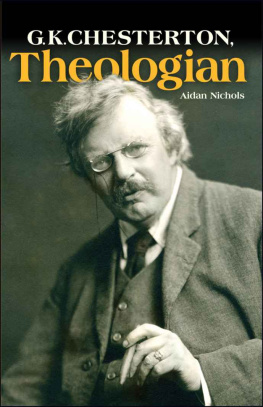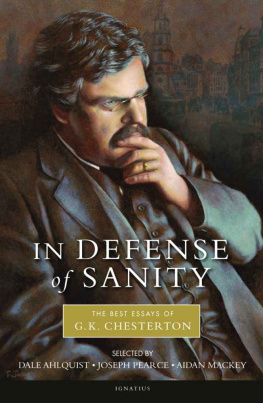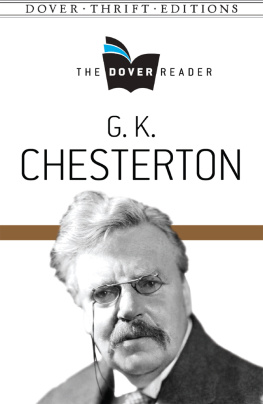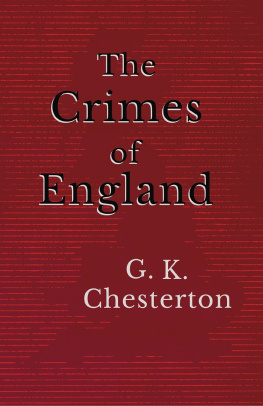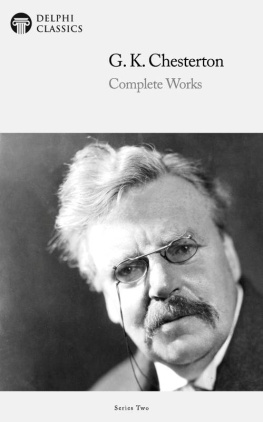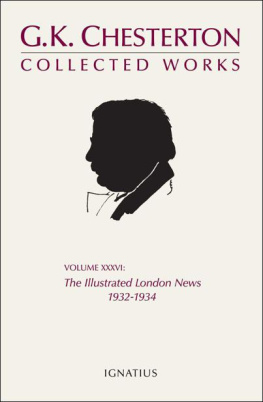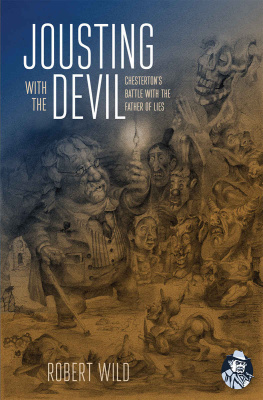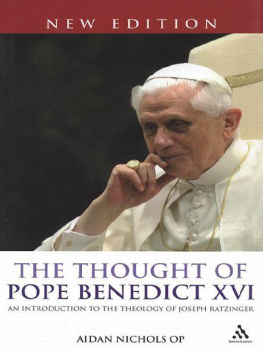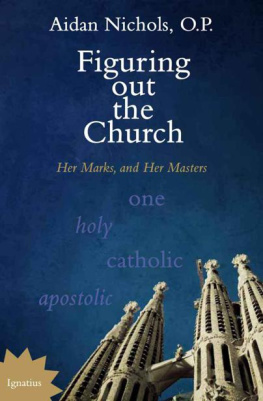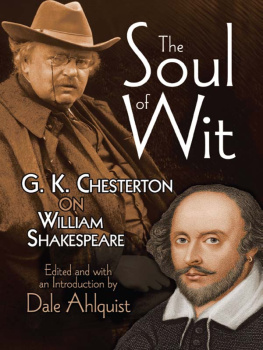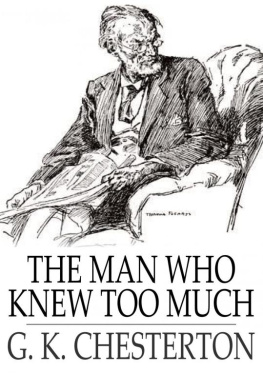Aidan Nickols - G.K. Chesterton, Theologian
Here you can read online Aidan Nickols - G.K. Chesterton, Theologian full text of the book (entire story) in english for free. Download pdf and epub, get meaning, cover and reviews about this ebook. year: 2012, publisher: Sophia Institute Press, genre: Detective and thriller. Description of the work, (preface) as well as reviews are available. Best literature library LitArk.com created for fans of good reading and offers a wide selection of genres:
Romance novel
Science fiction
Adventure
Detective
Science
History
Home and family
Prose
Art
Politics
Computer
Non-fiction
Religion
Business
Children
Humor
Choose a favorite category and find really read worthwhile books. Enjoy immersion in the world of imagination, feel the emotions of the characters or learn something new for yourself, make an fascinating discovery.
- Book:G.K. Chesterton, Theologian
- Author:
- Publisher:Sophia Institute Press
- Genre:
- Year:2012
- Rating:4 / 5
- Favourites:Add to favourites
- Your mark:
- 80
- 1
- 2
- 3
- 4
- 5
G.K. Chesterton, Theologian: summary, description and annotation
We offer to read an annotation, description, summary or preface (depends on what the author of the book "G.K. Chesterton, Theologian" wrote himself). If you haven't found the necessary information about the book — write in the comments, we will try to find it.
G.K. Chesterton, Theologian — read online for free the complete book (whole text) full work
Below is the text of the book, divided by pages. System saving the place of the last page read, allows you to conveniently read the book "G.K. Chesterton, Theologian" online for free, without having to search again every time where you left off. Put a bookmark, and you can go to the page where you finished reading at any time.
Font size:
Interval:
Bookmark:
G.K. Chesterton,
Theologian
Aidan Nichols
SOPHIA INSTITUTE PRESS
Manchester, New Hampshire
Copyright 2009 Aidan Nichols
Printed in the United States of America
All rights reserved
Cover design by Theodore Schluenderfritz
No part of this book may be reproduced, stored in a retrieval system, or transmitted in any form, or by any means, electronic, mechanical, photocopying, or otherwise, without the prior written permission of the publisher, except by a reviewer, who may quote brief passages in a review.
Sophia Institute Press
Box 5284, Manchester, NH 03108
1-800-888-9344
www.SophiaInstitute.com
G.K. Chesterton, theologian / Aidan Nichols.
p.cm.Includes bibliographical references.ISBN 978-1-933184-50-0 (pbk. : alk. paper) 1. Chesterton, G. K. (Gilbert Keith), 1874-1936 Criticism and interpretation. 2. Chesterton, G. K. (Gilbert Keith), 1874-1936 Religion. 3. Theology in literature. I. Title.
PR4453.C4Z735 2009
823.912 dc222009005822
For John Osman
Preface
This study has a straightforward form. The book falls, in effect, into two halves. The first opens by offering an overview of Chestertons life, an overview that already identifies some salient intellectual themes. Chapter 2, on the Edwardian writers who were his earliest controversial opponents, chiefly explores materials found in his first major work, Heretics. Chapter 3 centres on Orthodoxy , which Chesterton intended to be read with Heretics in ones other hand, though it also ranges more widely in detailing Chestertons discovery of metaphysical realism, his version of Catholic Christianitys philosophia perennis . Chapter 4 investigates the most distinctive of Chestertons imaginative and argumentative strategies, the paradox.
Then in the second half of this enquiry, I consider five theological themes: Chestertons argument for the existence of God, his theological anthropology, his Christology, his moral theology, and his ecclesiology or, more widely, his overall sense of the Catholic Church and her faith.
Alison Milbanks study of Chesterton and Tolkien as theologians reached me too late for me to profit from it in the present study (as did also William Oddies marvellously detailed study of Chestertons early years). I am delighted to see, however, that she looks in this direction for light. I hope that, in the wake of her more ambitious work, this modest book will help to encourage theological interest in Chesterton, and indeed, the interest of Chestertonians in theology.
Aidan Nichols,
O.P. Blackfriars, Cambridge
Ash Wednesday, 2008
Introduction
It is not customary to consider G. K. Chesterton a theologian, although his sympathy with theologians is unmistakable. In Christendom in Dublin he registered his annoyance with the tired and tiresome voice of the general scepticism which talks with eternal reiteration about the quarrels of theologians.
One would suppose that nobody had ever quarrelled except theologians; or that theologians had never done anything else. But if there be one thing morally certain, it is that the world will quarrel much more without theology than it ever did with theology.
Chesterton considered this self-evident, since people left without any common theory, or attempt at a theory, will be able to quarrel about absolutely anything whatever; including all the things on which men have hitherto agreed.
Once remove the old arena of theological quarrels, and you will throw open the whole world to the most horrible, the most hopeless, the most endless, the most truly interminable quarrels; the untheological quarrels.
So winning a statement should not go without its theological reward.
Chestertons Theological Help
That is one reason for writing this book. Moreover, Chesterton has not only praised theologians; he has helped them. In the face of an agnosticism that has set its face against Christianity, he is attractive, indeed persuasive. As he put it with characteristic winningness in his study of William Blake:
You cannot take the region called the unknown and calmly say that though you know nothing about it, you know that all its gates are locked. That was the whole fallacy of Herbert Spencer and Huxley when they talked about the unknowable instead of about the unknown. An agnostic like Huxley must concede the possibility of a gnostic like Blake.
We do not know enough about the unknown to know that it is unknowable.
And since Chesterton was never afraid of risk-taking with his readership, he would go further:
When Blake lived at Felpham angels appear to have been as native to the Sussex trees as birds. His patriarchs walked on the Sussex Downs as easily as if they were in the desert.
Should we simply say, then, asks Chesterton, that Blake was mad? He replies: Surely we cannot take an open question like the supernatural and shut it with a bang, turning the key of the madhouse on all the mystics of history.
In The Curse of the Golden Cross, Father Brown is made to declare, I can believe the impossible, but not the improbable. The Byronic young American Paul T. Tarrant asks, Thats what you call a paradox, isnt it?
Its what I call common sense, properly understood, replied Father Brown. It really is more natural to believe a preternatural story, that deals with things we dont understand, than a natural story that contradicts things we do understand. Tell me that the great Mr Gladstone, in his last hours, was haunted by the ghost of Parnell, and I will be agnostic about it. But tell me that Mr Gladstone, when first presented to Queen Victoria, wore his hat in her drawing-room and slapped her on the back and offered her a cigar, and I am not agnostic at all. That is not impossible, its only incredible.Chesterton may not have considered himself a theologian. But he knew that theology was thought applied to religion, and as Stratford Caldecott remarks, Very few have applied thought to religion as effectively as he.
Chesterton and the English
Contribution to Catholicity
Another reason, and a more autobiographical one, for writing this book, is bound up with my own latest excuse for returning to Chesterton. In a recent book, I selected him as one of half a dozen or so sages or critics of the culture who might help to re-launch the mission of a Christian intelligentsia in contemporary English society. In The Realm: An Unfashionable Essay on the Conversion of England , I confessed my admiration for Chestertons approach to apologetics: how Christianity satisfies at one and the same time our deep conviction that we are at home in the world and yet do not really belong to it.
Chesterton also has much to offer the wider cause of reconstructing English identity, since his prescription in the 1920s is as pertinent now as it was then: What is wanted for the cause of England today is an Englishman with enough imagination to love his country from the outside as well as the inside. I am inclined to trust his judgements owing to his sympathy with culture both low and high, and to the assurance and congeniality with which he moved among the classics of the English literary canon. Let us add, too, in the latter connection, his generosity of spirit, as in this encomium on Thomas Hardy:
People talk of the pessimism of Hardy as ruthless, and in its artistic method it was ruthless, often at the expense of reason and probability. But if he changed spiritually, it was always towards feeling less of the ruthlessness and more of the ruth. I should be very much surprised to learn that Hardy, especially in later life, was really a pessimist at all. His theory, as a theory, is not very clear or complete; but I am sure he did not become more clear or more complete, in the sense of more convinced of a dogma of despair.
Next pageFont size:
Interval:
Bookmark:
Similar books «G.K. Chesterton, Theologian»
Look at similar books to G.K. Chesterton, Theologian. We have selected literature similar in name and meaning in the hope of providing readers with more options to find new, interesting, not yet read works.
Discussion, reviews of the book G.K. Chesterton, Theologian and just readers' own opinions. Leave your comments, write what you think about the work, its meaning or the main characters. Specify what exactly you liked and what you didn't like, and why you think so.

